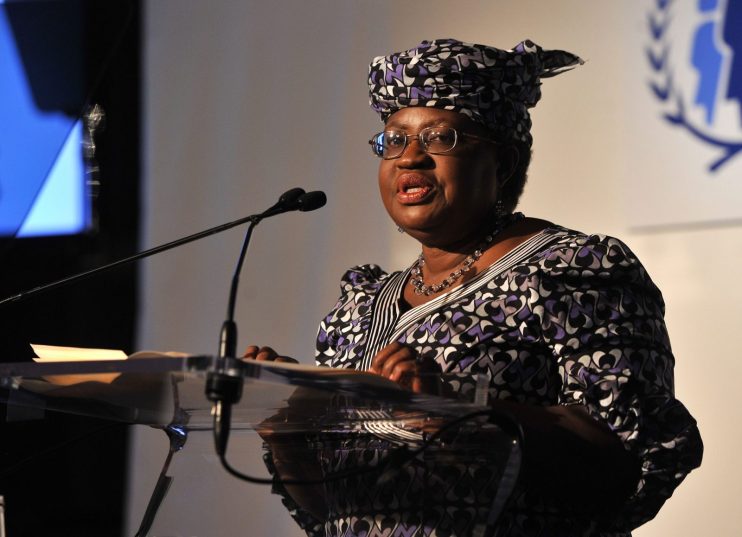A new WTO boss who understands Africa is a good thing for the global economy

After diplomatic horse-trading, the new head of the WTO has been all but confirmed – former Nigerian finance minister Ngozi Okonjo-Iweala. She will be the first African to take the role. The Rt. Hon. Mark Simmonds, a former Foreign Office minister with responsibility for the continent, argues it’s a good thing for the globe. Okonjo-Iweala’s familiarity with Nigeria’s struggles will make her a strong appointment to launch a truly global effort that spreads the benefits of freer trade.
The impasse over who will become the next director-general of the WTO has at last come to a conclusion. Following South Korean Trade Minister Yoo Myung-hee’s withdrawal from the selection process, the path is now clear for Ngozi Okonjo-Iweala, a widely respected former Nigerian finance minister, to become the first woman and first African to lead the WTO. The Biden administration’s backing of her candidacy – after months of stonewalling by the Trump White House – means her appointment is a formality.
At a time when the global trade system is in desperate need for a cooperative and inclusive response to the Covid-19 pandemic and simmering US-China relations, all member states should welcome fresh leadership at the WTO. Yet perhaps more significantly, I believe the historic appointment of a Nigerian to lead the WTO, someone who has a clear vision of how the organisation can renew itself at this critical moment, will be a boon for the global economy.
Read more: UK announces inquiry into alleged corruption in British Virgin Islands
As Africa’s largest economy and most populous nation, Nigeria is long overdue recognition at the top table of international diplomacy. With more Nigerians born every day than the whole of Western Europe combined, its already 200 million-strong population is expected to double by 2050. That sheer, demographic heft is why it is rightly considered a future giant of the global economy. And it’s why Nigeria will find itself at the heart of the fight against climate change and other global challenges ahead.
For the incoming WTO head, harnessing the power of global trade to boost development in countries like Nigeria will be a key yardstick for success. A more prosperous and inclusive future relies on trade cooperation between nations from across the development spectrum. The WTO’s ability to facilitate trade links in this manner will be integral to the health of the global economy during this century.
Here, Dr Okonjo-Iweala’s experience and expertise both in government and as Managing Director of the World Bank is unparalleled. Indeed, her unique and development-minded perspective is why she emerged as the front runner for the WTO post over many other highly qualified candidates, including South Korea’s Yoo Myung-hee.
In many ways, Nigeria epitomises the vibrancy of nations which have such an essential role to play in growing the global economy. An enormously successful diaspora is thriving in business and the arts around the world while at home, new generations of entrepreneurial Nigerians are embracing the possibilities afforded by digital technologies to develop state-of-the-art industries. The country boasts 90 tech hubs, the most in Africa, and a flourishing community of start-ups that signal a promising way forward for a modern, diversified economy.
Nigeria’s domestic requirements for growth are likewise mirrored across Africa and the developing world. Upgrading the country’s infrastructure to accommodate the ambitions of its young wealth creators is a key pillar of the incumbent Buhari administration’s growth plan. Nigeria has made serious efforts to pivot its economy away from oil, investing heavily in broadband coverage to boost the digital economy and signature infrastructure projects like the second Niger bridge to connect regional hubs to global value chains. Rooting out corruption, with Nigeria ranking 149th in Transparency International’s Corruption Index, is another central challenge.
Read more: If Nigeria wants to take part in global markets, it must shape up and honour its obligations
Importantly, by establishing the means for stable economic growth, Nigeria will also be better able to cope with the demand pressures on its education and social security systems, and fully capitalise on the economic potential of its booming population. For the UK and US, in particular, who share a deep cultural affinity with Nigeria, supporting the development of a regional powerhouse of sub-Saharan Africa should be a strategic priority.
The appointment of Ngozi Okonjo-Iweala will open a new chapter for the WTO. In the short term, the organization will have a key role in facilitating a more equitable distribution of vaccines as the world wrestles with Covid-19. As a former Chair of the vaccine alliance Gavi, whose COVAX scheme is leading efforts to ensure lower-income economies have access to vaccines, Dr Okonjo-Iweala is uniquely well placed to drive forward the WTO’s efforts in this area.
But ultimately, the organisation’s future success relies on its ability to translate trade liberalisation into development progress. With a Nigerian at the helm, a woman who understands what it takes to drive forward economic progress in the developing world and what obstacles lie in the way, I am optimistic for the future.
A first African director-general of the WTO, in a year in which the landmark African Continental Free Trade Agreement came into effect, would be a double boost for Africa and for world trade. I look forward to Dr. Okonjo-Iweala’s swift appointment, so she can get on with the job at hand.